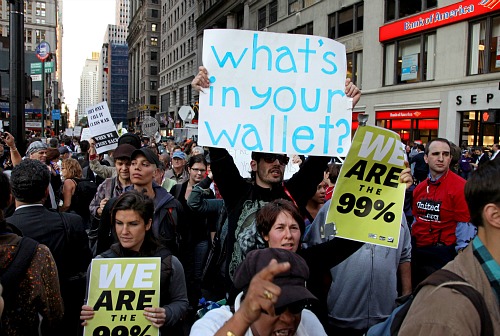<#313 Spotlight>
Struggling for Democracy in the United States
By Michael Springate, Visiting Scholar at the May 18 Institute
A popular struggle for democracy is growing in the United States. Far from being assured victory, the struggle is united by its awareness of the fading power of democratic ideals and equality before the law in American society. A few examples:
· the U.S. remains engaged in unpopular, expensive wars, justified through lies, which are fought in spite of, not for, the interests of the majority of Americans;
· the growth of extreme social inequalities supported by taxation and fiscal policies which, paraded as being good for the economy, were good for a very few;
· a Justice Department which turns a blind eye to systemic, on-going financial crimes (as well as to torture), while willing to jail for life, and justify the assassination of, uncharged and unconvicted American Muslims;
· the phenomenal growth of a “security state” which militarizes local police in a society with the highest incarceration rates in the world;
· a radical Supreme Court which continues to reverse the course of English jurisprudence, most recently by determining that corporations can make unlimited political campaign contributions because “as individuals” they are constitutionally guaranteed the right to do so.

However, the direct cause of anger sweeping the public has been the socializing of the losses of hundreds of billions of dollars of bad investments – much of it generated through conscious fraud by banks and investment houses. These enormous funds found to cover the crimes of large financial organizations are, for some reason, not available to the majority who continue to endure cuts to what it needs most: education, jobs, health, social infrastructure.
To put it simply, that is taxation without representation. So the breadth of support for the Occupy Wall Street movement in cities large and small, on both coasts and within the heartland, should not be considered surprising.
It’s sobering to think that the US ranks 93rd in the world in terms of income equality, behind China, India and Iran. It’s sobering to realize that its unemployment rate is the highest its been since the great depression, and that fully one half of its children are in a worse financial situation than the American children 35 years ago. And it’s sobering to consider that all this is happening when American corporate profits are near an all time high.
Yes, sobering when considered at a distance, but enraging when lived in the present.
Why do 1% of Americans own 42% of its wealth? Why are the taxes on the wealthy close to the lowest they have ever been? Why can’t fifty million people afford to see a doctor when sick? Why do forty seven million people need food assistance?
Trying to keep the critical questions forefront, the Occupy Wall Street movement exhibits five remarkable features:
First, if the priority is to occupy Wall Street, then it’s not to occupy Iraq, Afghanistan, Pakistan or Iran. A movement that defines the primary enemy of Americans as systemic injustice from within challenges political taboos. Can it possibly be true that the current ills of America are not the fault of Iranians, Muslims or the Chinese?
Secondly, by accurately clarifying the huge gap between the 1% elite and the other 99%, the movement tries to overcome the class and race divisions which have undermined previous reform movements. Some may find an alliance of the truly poor with well paid managers as heretical, or between socialists on the left and libertarians on the right as impossible, but in the current historical context it’s legitimate – there being more than enough common ground – and it’s a necessity.
Thirdly, the movement has spread through a pattern of self-generating cells, avoiding a centralized and hierarchical structure. This allows the movement to reflect a variety of causes rooted in local conditions led by local people, and it makes it harder for authorities to identify, anticipate and suppress the movement’s growth.
Fourthly, the movement is part of a long and slow process of Americans learning from the experiences of others. Occupy Wall Street is not an example of an American movement leading the charge towards global social justice. It is, rather, Americans catching up to populist and pro-democratic movements of resistance long established elsewhere.
And finally, the movement, because it is open and public, because it relies on broad and active participation, because it fights for collective rights, because it is predicated on the belief that alternatives are possible, is working to offset the culture of fear, despair and individual isolation that has gripped the US for a long time.
The crisis in America is not simply an economic, political or moral crisis, it is all of that and more. It is a cultural crisis, where the very definitions of reality generated within the culture have become unsustainable.
________________
Michael Springate is a writer and film producer, currently in residence at the May 18 Institute. His film Acts of Imagination (2006) captured the cynicism and hope of ‘post-socialist’ Ukrainian immigrants living in Canada. It had its Asian premiere at the Busan International Film Festival. His next project, to be shot in 2012, captures the evolving culture of resistance in the ethnic diversity of east end Vancouver. He is using his time in Gwangju to better understand the democratization movement in South Korea, with an emphasis on actions in Jeolla Province.
Michael Springate 518연구소 방문학자
tribune1968@cnumedia.com

